Key takeaways:
- Ethical branding aligns values with societal expectations, fostering trust and meaningful connections between brands and consumers.
- Transparency is essential, as it builds trust, enhances loyalty, and empowers informed consumer choices while differentiating brands in a competitive market.
- Social responsibility and sustainability are integral to modern branding strategies, influencing consumer behavior and creating a sense of community and shared values.
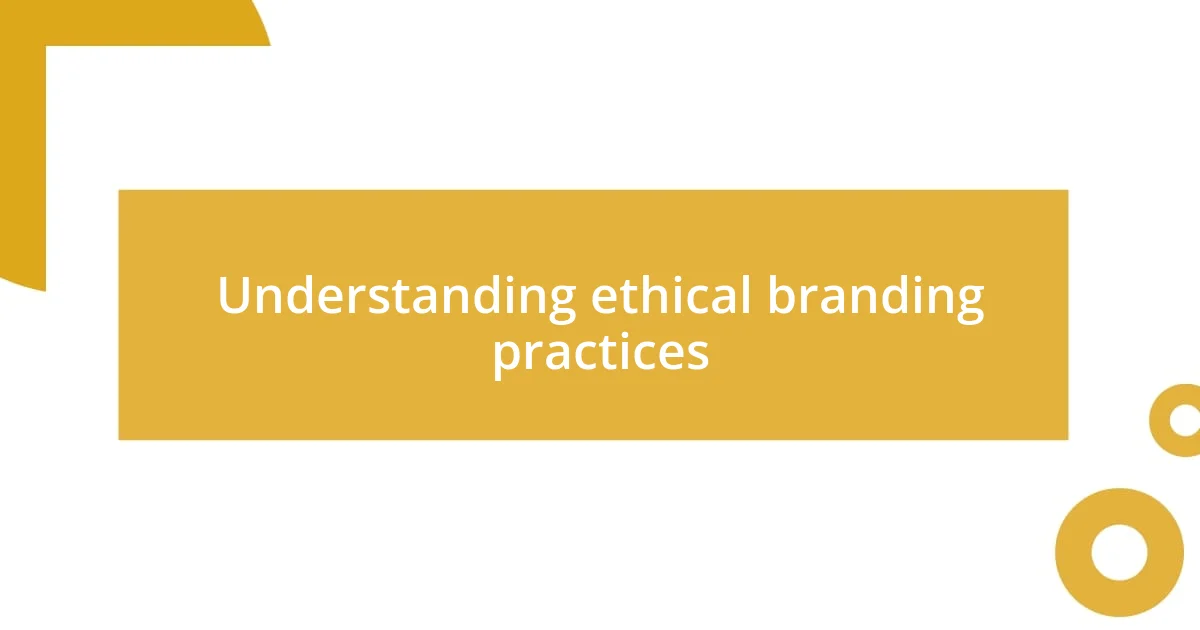
Understanding ethical branding practices
Ethical branding practices revolve around the idea of aligning a brand’s values with societal expectations and moral standards. I’ve seen how brands that genuinely embrace these practices resonate more deeply with customers. It’s fascinating to think—what if every purchase we made could actually reflect our values?
When I first encountered a brand that openly shared its sustainable sourcing practices, it changed my perspective on consumerism. The transparency they offered created a sense of trust that I hadn’t experienced before. I often wonder how many of us are willing to pay a little more for products that not only meet our needs but also contribute positively to the world around us.
A key aspect of ethical branding is taking responsibility for the impact a company has on its environment and community. I remember feeling uplifted when a local business launched a campaign to support fair wages for its workers. Isn’t it inspiring when companies choose to prioritize ethics over mere profits? It truly shows that branding isn’t just about selling—it’s about creating meaningful connections.
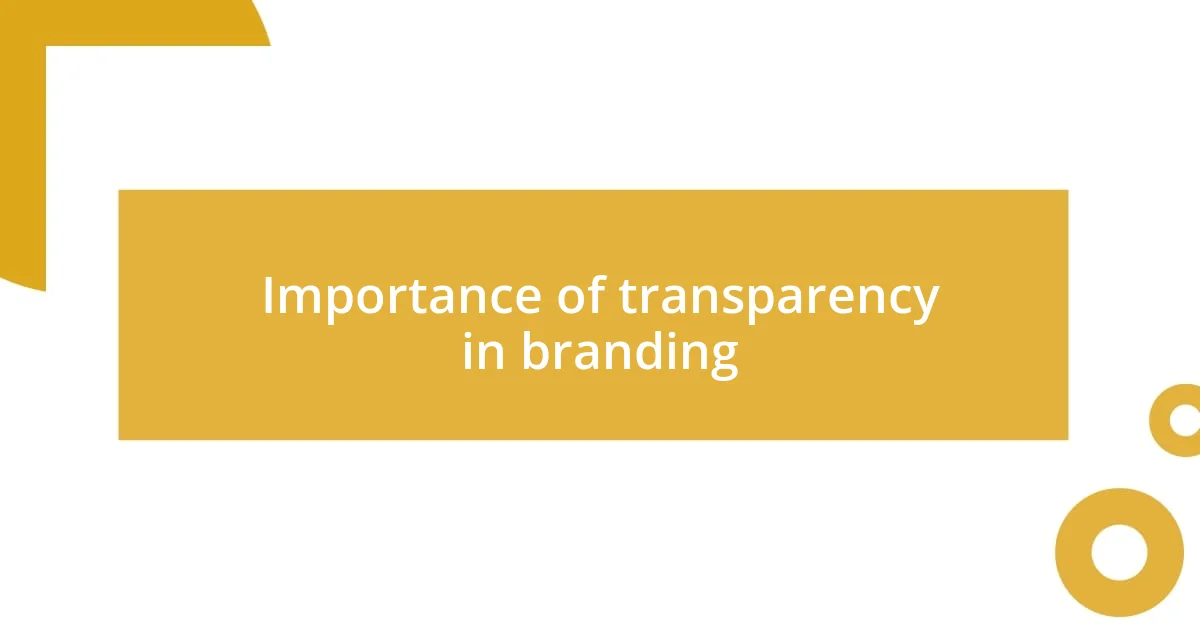
Importance of transparency in branding
Transparency in branding isn’t just a trend—it’s a necessity. I recall a time when I purchased a product because the brand laid out its entire manufacturing process. They didn’t just boast about their eco-friendly materials; they showed evidence of their commitment. It turned out to be a pivotal moment for me as a consumer. It’s comforting to know where our products come from and how they’re made. That peace of mind transforms a simple transaction into a thoughtful choice.
Here are some reasons why transparency matters in branding:
- Builds Trust: When a brand is open about its practices, it fosters trust with its audience.
- Enhances Loyalty: Consumers are more likely to stick with brands that are honest and transparent about their values.
- Encourages Informed Choices: Transparency empowers customers to make decisions that align with their personal ethics.
- Drives Accountability: Brands that commit to openness are more likely to hold themselves accountable for their impact on society and the environment.
- Differentiates from Competitors: In a crowded market, transparency can set a brand apart, attracting customers who value authenticity.
Remembering the pride I felt while supporting a brand that advocated for fair practices makes me realize how vital this openness is in our modern marketplace. Transparency can truly elevate the consumer experience, making it not only about the products we buy but the values we support.
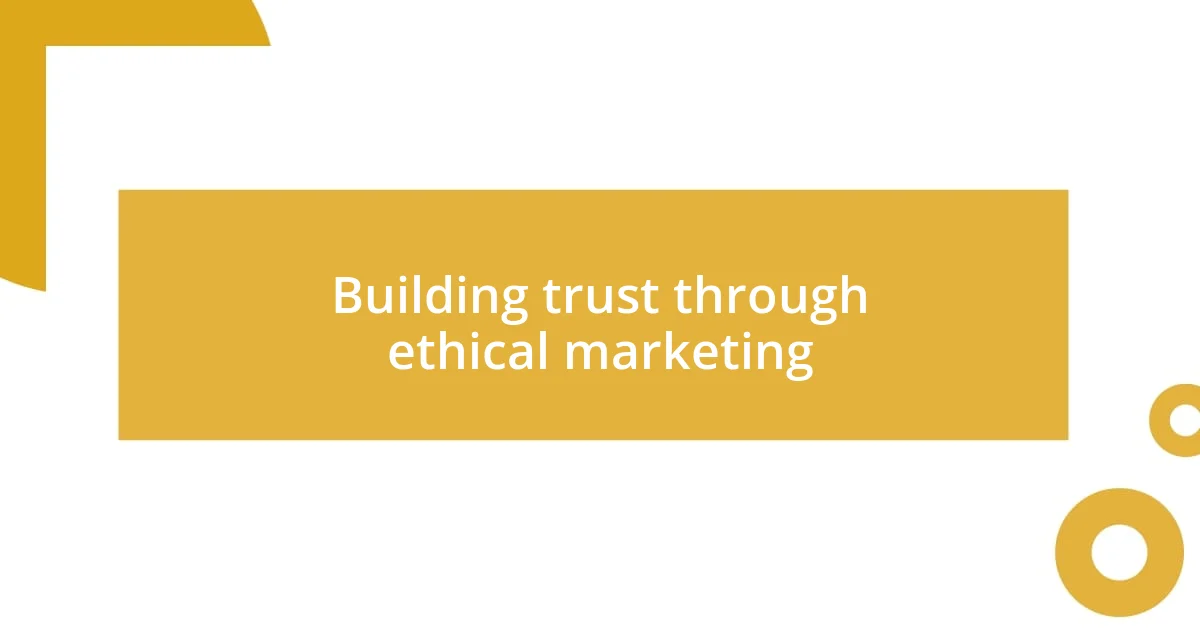
Building trust through ethical marketing
Building trust through ethical marketing is essential in today’s conscious consumer landscape. I’ve experienced firsthand how brands that prioritize ethics in their marketing resonate more profoundly with their customers. When I came across a company that advocated for social justice while explaining how its products contributed to community upliftment, I felt an immediate connection. It’s empowering to support brands that not only provide quality but also stand for values I believe in.
Ethical marketing isn’t just about honesty; it’s about creating a narrative that customers can align with emotionally. I remember a campaign from a beauty brand that showcased real customers instead of models, featuring genuine testimonials about their products. This approach made me feel represented and valued, leading to a deeper trust. I often think, isn’t it rewarding to connect with brands that mirror our values and experiences?
In the end, ethical marketing fosters a relationship built on trust and mutual respect. I was shopping one day when a friend shared how a particular coffee brand invests in local farmers, ensuring fair wages and sustainable practices. It reminded me how impactful ethical marketing can be—not just for companies, but for the communities they touch. Seeing a brand actively make a difference inspires me to support them, creating a cycle of trust that benefits everyone involved.
| Aspect | Traditional Marketing |
|---|---|
| Trust | Focuses on selling products, often lacking transparency. |
| Emotional Connection | Utilizes superficial appeals, seldom relates to consumer values. |
| Accountability | Limited commitment to ethical practices, tends to prioritize profit. |
| Customer Loyalty | Dependent on price and promotions rather than shared values. |
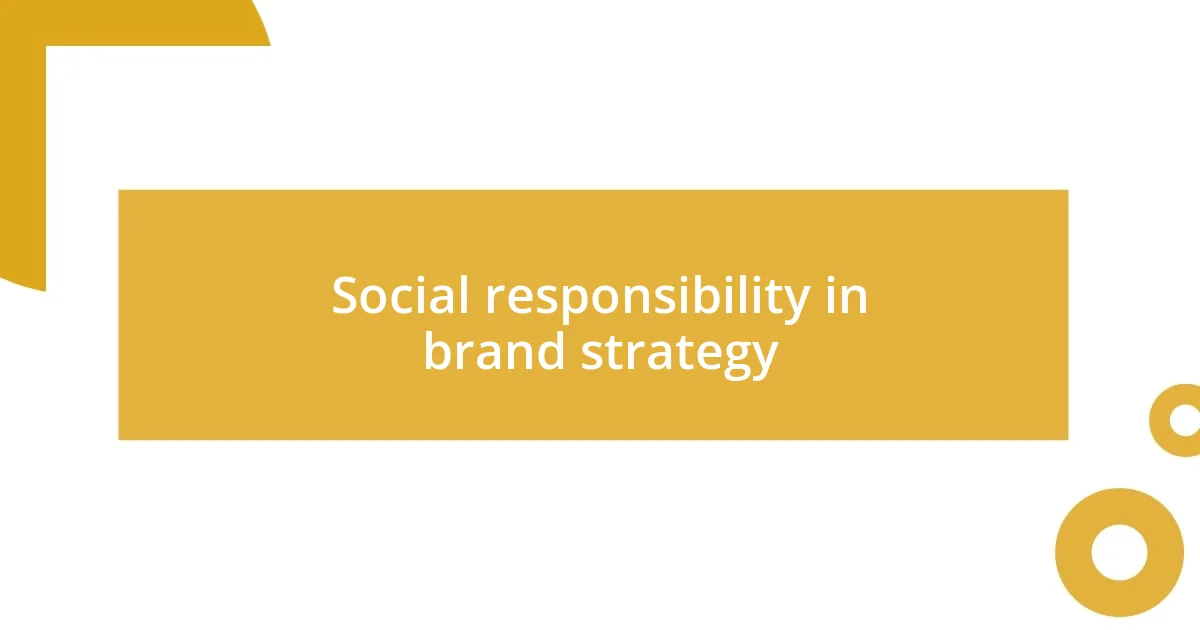
Social responsibility in brand strategy
Social responsibility is becoming a cornerstone of brand strategy. Many times, I find myself drawn to brands that actively engage in causes that resonate with me. For instance, I once bought a pair of sneakers from a company that donates a pair of shoes for every pair sold. It struck me how powerful it is when a brand aligns its mission with social good. It’s not just about selling; it’s about making a difference.
Recently, I came across a campaign from an apparel brand that revamped its production practices to focus on sustainability. They partnered with local artisans and highlighted their stories in the marketing. This approach not only showcased the craftsmanship but also instilled a sense of community and purpose that I found deeply moving. Have you ever felt a sense of pride knowing your purchase supports a larger cause? It truly makes the experience more meaningful.
Social responsibility also influences consumer behavior in compelling ways. I’ve noticed that when brands advocate for important issues—like environmental protection or social equity—I’m more likely to engage with them. It makes me wonder: can a brand’s genuine commitment to social responsibility inspire action beyond consumerism? I believe it can, as it fosters not just customer loyalty but also a thriving community that champions shared values.
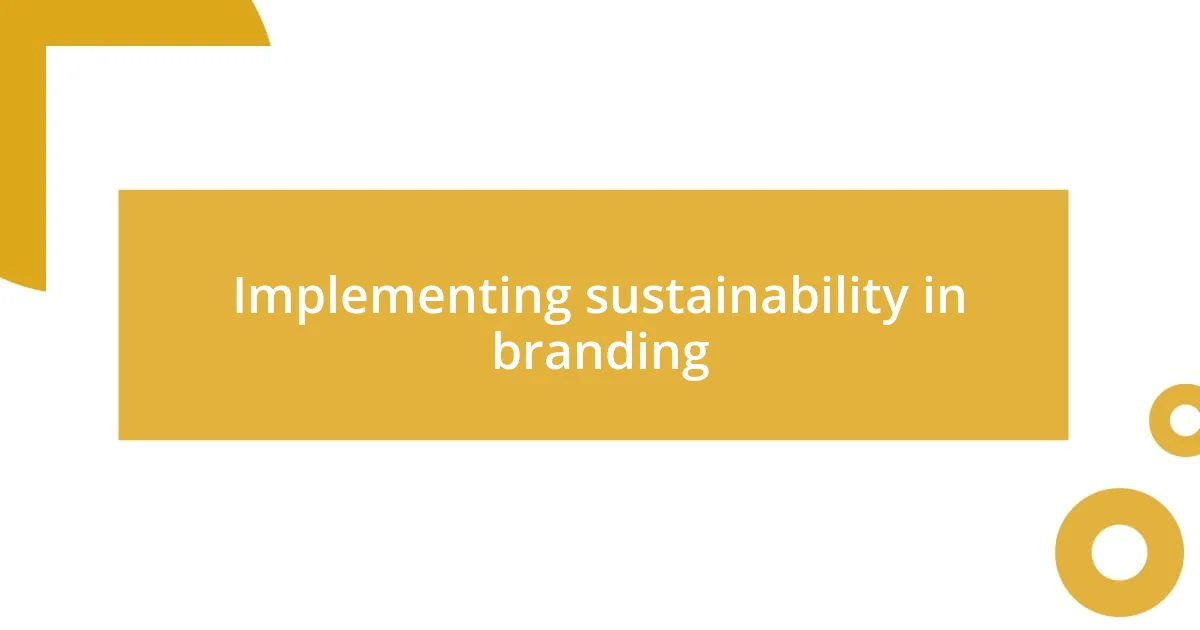
Implementing sustainability in branding
Implementing sustainability in branding isn’t just a trend; it’s a necessity in today’s market. I remember trying out a skincare line that emphasized eco-friendly packaging. Every time I recycled the container, I felt a sense of satisfaction, knowing my choice supported a brand committed to reducing waste. Isn’t it inspiring when our daily decisions contribute to a healthier planet?
Sustainable branding also calls for transparency. A tech company I admire openly shares its supply chain practices. When I learned about their commitment to sourcing conflict-free materials and paying fair wages, it deepened my trust in them. What’s more, I appreciated that their marketing didn’t just boast about their products but educated customers on the importance of ethical sourcing. It’s like having a conversation rather than just being sold to, which I truly value.
Furthermore, I often reflect on how companies can create a culture of sustainability through storytelling. I was captivated by a clothing brand that showcased real workers in its factories, discussing their dedication to sustainable practices and fair treatment. This narrative made me feel a connection to the people behind the products. Don’t you find it powerful when brands humanize their efforts to be sustainable? It not only makes the purchase feel more meaningful but also invites us to be part of a larger movement toward ethical consumption.
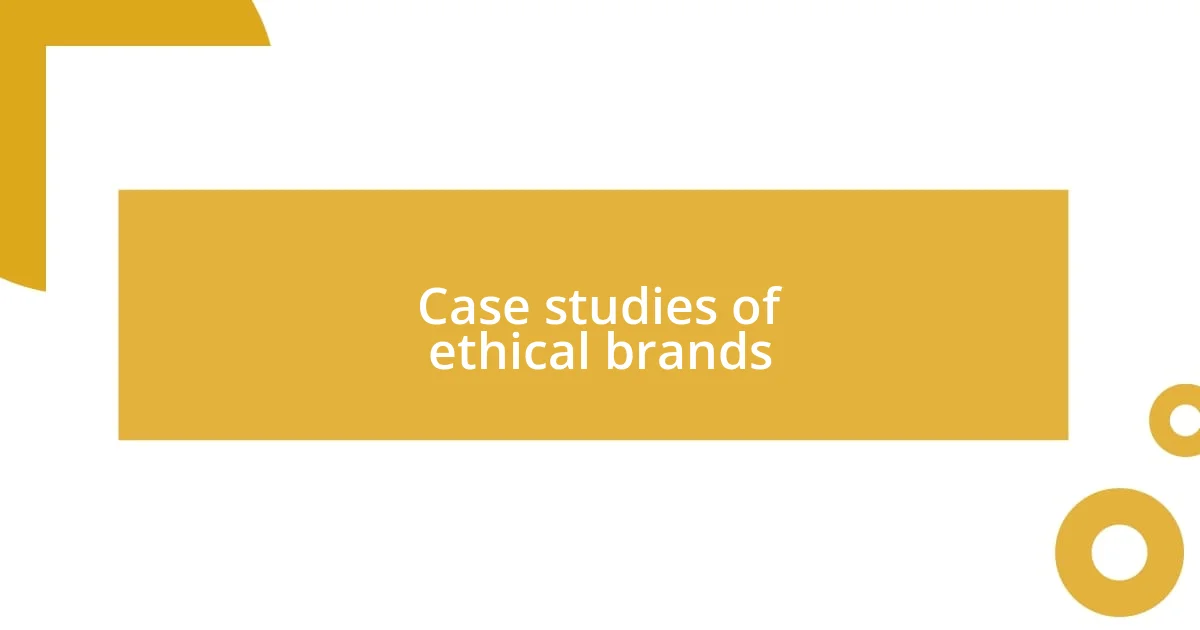
Case studies of ethical brands
I recently delved into the story of a popular coffee brand committed to fair trade practices. Each time I enjoy my morning brew from them, I can’t help but think about the farmers whose lives are positively impacted due to fair wages. Have you ever felt that warmth in your heart, knowing your caffeine habit supports a better livelihood for someone thousands of miles away? It’s a small action that fuels a much larger impact.
Another significant example is a beauty brand that channels its profits into education for girls in underserved communities. I remember when I purchased one of their products and received a heartfelt note explaining how each purchase helps fund scholarships. It made me reflect on the privilege of education and how my choice, however small, can spark change. Doesn’t it give you a sense of connection when your shopping habits contribute to empowering others?
Moreover, I was particularly impressed by a brand that creates ethical fashion from recycled materials. They hosted a design competition, inviting customers to submit ideas for new products. I found it exhilarating to see how they valued customer input, turning consumers into co-creators. Have you ever felt inspired knowing that your ideas could shape a brand’s future? This kind of participation fosters a deep sense of community and investment in the brand’s mission.













